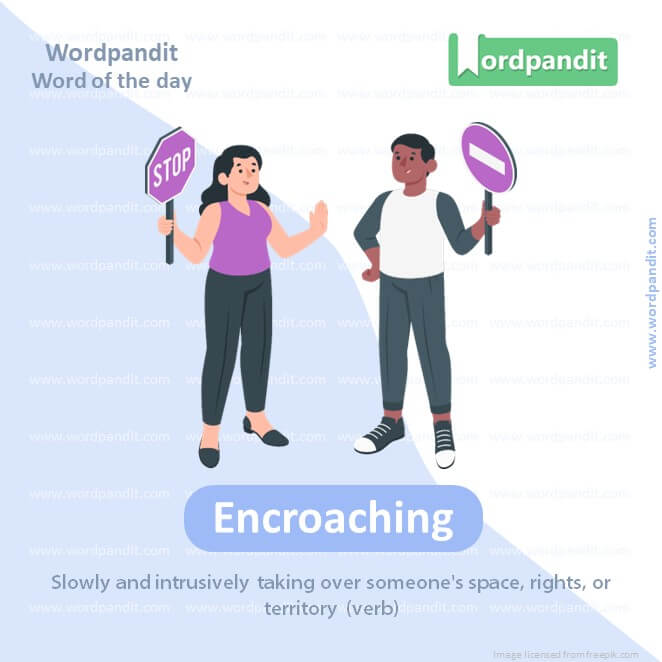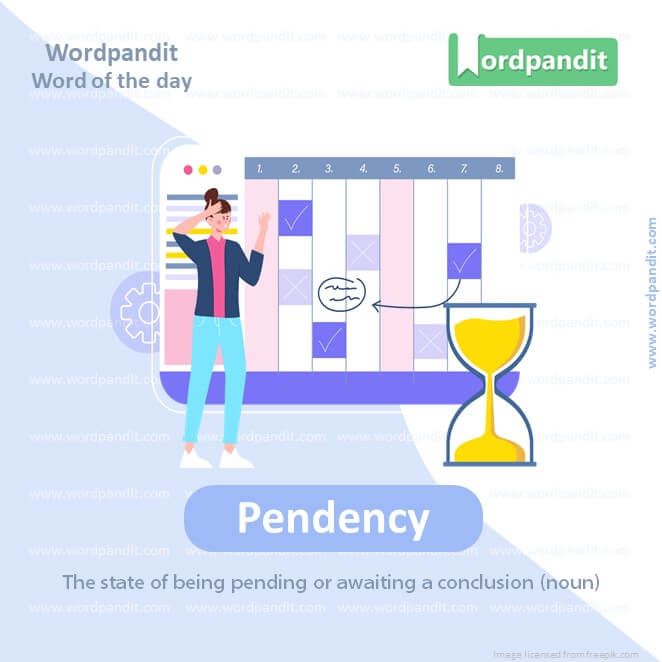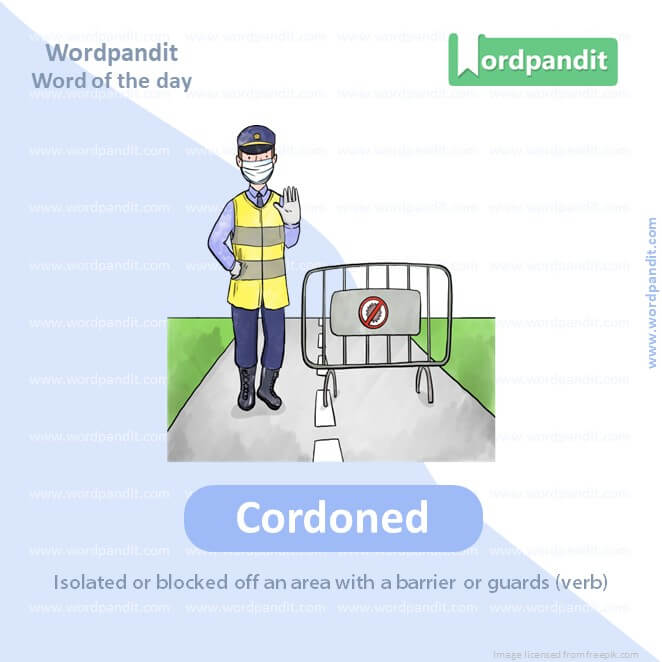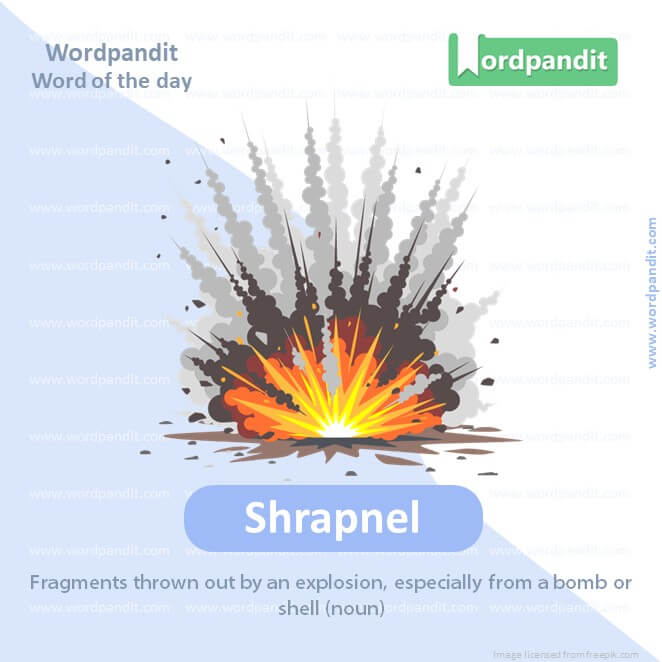Daily Vocabulary Words: List of Daily Used Words
Hi there. Welcome to this special section @ Wordpandit.
Our endeavour here is straightforward: highlighting important daily vocabulary words, you would encounter in The Hindu. This is your repository of commonly used words; essentially, we are posting a list of daily used words. Hence, this has significant practical application as it teaches you words that are commonly used in a leading publication such as The Hindu.
Visit the website daily to learn words from The Hindu.

WORD-1: Encroaching
CONTEXT: In a notice dated October 11 issued to all the shops at the New Bus Stand, Suramangalam Assistant Commissioner Stanley Babu said that a few shops were found encroaching platforms by keeping LPG cylinders and stoves.
SOURCE: The Hindu
EXPLANATORY PARAGRAPH: Imagine you have a toy space that’s only for you. But, your little brother slowly starts putting his toys in your space without asking. He’s taking over bit by bit. That’s what “encroaching” means, someone or something slowly and sneakily taking over another’s space or rights.
MEANING: Slowly and intrusively taking over someone’s space, rights, or territory. (verb)
PRONUNCIATION: en-KROH-ching
SYNONYMS: Intruding, Invading, Trespassing, Infringing, Impinging, Overstepping, Usurping
USAGE EXAMPLES:
1. The city is worried about the sea encroaching on the beachfront.
2. Wild animals began encroaching on the farmer’s land.
3. Many villagers felt the new factory was encroaching on their traditional way of life.
4. My neighbor’s plants are encroaching on my driveway.

WORD-2: Pendency
CONTEXT: the Coimbatore City Police will soon launch automated voice calls to remind them of the pendency.
SOURCE: The Hindu
EXPLANATORY PARAGRAPH: Imagine you’re in a line waiting for an ice-cream. Until you get your ice-cream, you’re in a “pending” state. “Pendency” is like that waiting period for something to happen or get finished.
MEANING: The state of being pending or awaiting a conclusion. (noun)
PRONUNCIATION: PEN-den-see
SYNONYMS: Delay, Holdup, Adjournment, Suspension, Postponement, Deferral, Lull
USAGE EXAMPLES:
1. The pendency of the court case frustrated the victims.
2. Due to a high number of applicants, there’s a pendency in processing the forms.
3. The project faced pendency due to a shortage of resources.
4. He was concerned about the pendency of his visa application.

WORD-3: Reminisced
CONTEXT: Mr. Ram reminisced that the late CM was amiable to the journalistic fraternity always.
SOURCE: The Hindu
EXPLANATORY PARAGRAPH: Think about the time you looked at old photos and remembered the fun times you had. When you think back and remember those good old times, you “reminisce”.
MEANING: Recalled or thought about past experiences with fondness. (verb)
PRONUNCIATION: rem-uh-NIST
SYNONYMS: Recalled, Remembered, Recollected, Thought back, Mused, Looked back, Reflected
USAGE EXAMPLES:
1. Grandma often reminisced about her younger days.
2. They reminisced about the adventures they had as children.
3. Over coffee, we reminisced about our college days.
4. He reminisced about the time he first met her.

WORD-4: Cordoned
CONTEXT: The area was cordoned off and police personnel were everywhere. Nobody in the neighborhood thought such a terror strike would happen here.
SOURCE: The Hindu
EXPLANATORY PARAGRAPH: Imagine a line of people holding hands, not letting anyone pass through. That’s like a “cordon”. When an area is “cordoned off”, it means nobody can enter or pass through.
MEANING: Isolated or blocked off an area with a barrier or guards. (verb)
PRONUNCIATION: KOR-dunned
SYNONYMS: Blocked, Barricaded, Sealed, Enclosed, Shut off, Screened, Isolated
USAGE EXAMPLES:
1. The police cordoned off the area after the accident.
2. The ancient ruins were cordoned to protect them from tourists.
3. They cordoned off the park due to a fallen tree.
4. The crime scene was quickly cordoned by investigators.

WORD-5: Shrapnel
CONTEXT: Mr. Sundar, nails used by the attacker as shrapnel reached his house.
SOURCE: The Hindu
EXPLANATORY PARAGRAPH: Imagine a big firework exploding and sending tiny pieces flying everywhere. “Shrapnel” is like those flying pieces, but it comes from exploding bombs or shells in wars and can be dangerous.
MEANING: Fragments thrown out by an explosion, especially from a bomb or shell. (noun)
PRONUNCIATION: SHRAP-nel
SYNONYMS: Fragments, Splinters, Debris, Spalls, Slivers, Flinders, Particles
USAGE EXAMPLES:
1. Many soldiers were injured by shrapnel during the battle.
2. The explosion sent shrapnel flying in every direction.
3. They discovered shrapnel embedded in the walls of the old building.
4. Protective gear is essential to guard against shrapnel.
WORD-6: Disenfranchisement
CONTEXT: There is a serious scope for disenfranchisement of south as politically powerful north gains more seats in Parliament and south will see a loss of political power.
SOURCE: The Hindu
EXPLANATORY PARAGRAPH: Imagine if someone told you, you couldn’t choose the flavor of your ice-cream because of some unfair rule. It would feel bad, right? “Disenfranchisement” is like that, but it’s when people are denied their rights, especially the right to vote.
MEANING: The removal or denial of the right to vote or other rights. (noun)
PRONUNCIATION: dis-en-FRAN-chiz-ment
SYNONYMS: Deprivation, Disqualification, Exclusion, Ostracization, Alienation, Marginalization, Disempowerment
USAGE EXAMPLES:
1. Many activists fought against the disenfranchisement of women in the past.
2. The new law led to the disenfranchisement of thousands.
3. Disenfranchisement of certain groups is a violation of human rights.
4. The history of voting rights is marred by periods of disenfranchisement.
WORD-7: Correlation
CONTEXT: There is a high correlation between the decline in population growth and the growth rate of the economy.
SOURCE: The Hindu
EXPLANATORY PARAGRAPH: Imagine you notice that every time you eat ice cream, it’s a sunny day. So, there’s a connection between eating ice cream and sunny days for you. “Correlation” is a fancy word for such a connection between two things.
MEANING: A mutual relationship or connection between two or more things. (noun)
PRONUNCIATION: kor-uh-LAY-shun
SYNONYMS: Connection, Link, Association, Bond, Tie, Relation, Affinity
USAGE EXAMPLES:
1. There’s a correlation between exercise and improved mental health.
2. Studies show a strong correlation between diet and overall well-being.
3. The scientist found no correlation between the two variables.
4. Understanding the correlation between factors helps in better decision-making.
WORD-8: Inescapable
CONTEXT: The logic of one person, one vote is inescapable.
SOURCE: The Hindu
EXPLANATORY PARAGRAPH: Imagine you’re playing a game of tag, and no matter where you run, the person who’s “it” is always right behind you. You can’t escape them. “Inescapable” means something you can’t avoid or get away from.
MEANING: Unable to be avoided or escaped. (adjective)
PRONUNCIATION: in-es-KAY-puh-bul
SYNONYMS: Unavoidable, Unpreventable, Certain, Inevitable, Unavoidable, Irreversible, Binding
USAGE EXAMPLES:
1. Aging is an inescapable part of life.
2. The inescapable truth was that they were lost.
3. No matter where she went, her past was inescapable.
WORD-9: Compliance
CONTEXT: When it came to overall compliance of the seven directives, nine States fell under the ‘good and satisfactory’.
SOURCE: The Hindu
EXPLANATORY PARAGRAPH: Think of “compliance” as following the rules. Like when you play a game, you need to follow its rules. In life, “compliance” means doing things according to certain rules or requests.
MEANING: The act of obeying a rule, request, or command. (noun)
PRONUNCIATION: kum-PLY-ens
SYNONYMS: Adherence, Conformity, Observance, Obedience, Accordance, Submission, Respect
USAGE EXAMPLES:
1. The company was checked for compliance with safety regulations.
2. All products must be in compliance with quality standards.
3. Compliance with the new law is mandatory.
4. The teacher emphasized the importance of compliance with school rules.
WORD-10: Deteriorated
CONTEXT: The overall air quality in the National Capital deteriorated from the ‘poor’ category to the ‘very poor’ category.
SOURCE: The Hindu
EXPLANATORY PARAGRAPH: Imagine your favorite toy getting old, its color fading and maybe even breaking a little. It’s not as good as before. That’s “deteriorated”. It means something becoming worse over time.
MEANING: Became worse or of lesser quality. (verb)
PRONUNCIATION: deh-TEER-ee-oh-ray-ted
SYNONYMS: Declined, Degenerated, Decayed, Worsened, Crumbled, Degraded, Waned
USAGE EXAMPLES:
1. The old building has deteriorated over the years.
2. His health deteriorated rapidly after the accident.
3. The painting deteriorated due to exposure to sunlight.
4. The relationship between the two friends deteriorated over a misunderstanding.
vocabulary 10 sentence
In the fascinating world of language learning, one of the most vital and effective methods is the ‘vocabulary 10 sentence’ strategy. An incredibly valuable tool, the ‘vocabulary 10 sentence’ approach assists language learners in an immersive, organic, and contextual manner often used in learning environments.
The ‘vocabulary 10 sentence’ strategy is essentially a practice where learners incorporate a new vocabulary word into 10 different sentences. Doing this repeatedly creates a thorough understanding of the word’s meanings, usage, context, and nuances. It is a learning technique that imitates the natural language acquisition process.
In a ‘vocabulary 10 sentence’ exercise, learners begin with choosing a new word, then crafting ten unique sentences involving that word. While this can seem challenging initially, it rapidly enhances one’s cache of usable vocabulary. Moreover, it allows learners to grasp a different range of contexts and applications for every new word, encouraging them to experiment with their language skills.
In traditional vocabulary learning methods, words are often learned as standalone entities with rigid definitions. In contrast, the ‘vocabulary 10 sentence’ technique encourages an understanding that words are dynamic and can have different meanings based on the context they are used in. This technique helps remove the constraints of rote memorization and promotes active learning instead.
The ‘vocabulary 10 sentence’ technique can be utilized by language learners at all stages. Setting a daily target for learning new words through this method can significantly speed up language acquisition and understanding.
In conclusion, the ‘vocabulary 10 sentence’ strategy can revolutionize the way you learn new languages. This ingenious approach motivates learners to explore beyond a word’s basic definition, diving into its usage in various contexts. By incorporating the ‘vocabulary 10 sentence’ technique into your daily language learning routine, you will actively participate in your own learning process, making it more effective and enjoyable.











